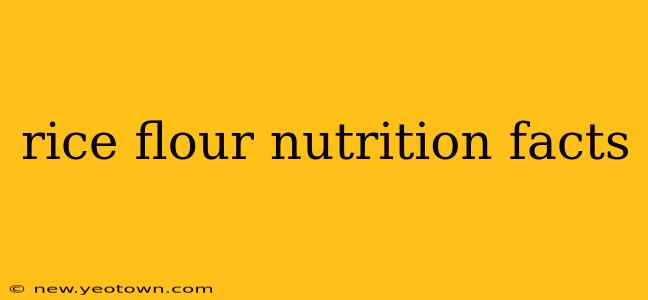Rice flour, a staple in many cuisines across the globe, offers a subtly sweet and delicate flavor, making it a popular choice for a variety of dishes, from cakes and pancakes to noodles and dumplings. But beyond its culinary versatility, rice flour boasts a unique nutritional profile. Let's delve into the nutritional facts of rice flour, exploring its benefits, drawbacks, and answering some frequently asked questions.
My name is Anya Petrova, and I've been a registered dietitian for over 15 years, specializing in gluten-free diets and alternative flours. I've witnessed firsthand the increasing popularity of rice flour and the questions surrounding its nutritional value. This post aims to clear up any confusion and provide you with a comprehensive understanding.
What are the Nutritional Benefits of Rice Flour?
Rice flour's nutritional profile varies depending on the type of rice it's derived from (brown rice, white rice, etc.). However, generally, it's a good source of carbohydrates, providing energy for your body. It's also relatively low in fat.
One cup (130g) of white rice flour, for example, typically contains around 450-500 calories and provides a significant portion of your daily carbohydrate needs. It also offers a small amount of iron and other minerals, though not as much as some other whole grains.
Brown rice flour, on the other hand, retains more of the bran and germ, leading to a higher concentration of fiber, vitamins, and minerals. This makes it a slightly more nutritious option compared to white rice flour.
Is Rice Flour Gluten-Free?
Is rice flour suitable for people with celiac disease or gluten sensitivity? This is a critical question, and the answer is generally yes. Rice flour is naturally gluten-free, making it a safe alternative for individuals following a gluten-free diet. However, always check the product label to ensure that it hasn't been processed in a facility that also handles gluten-containing grains, to avoid cross-contamination.
What are the Differences Between Brown Rice Flour and White Rice Flour?
What are the key differences between brown rice flour and white rice flour in terms of nutrition? The primary difference lies in the processing. Brown rice flour is made from whole brown rice, retaining the bran and germ. This results in a higher fiber content, contributing to better digestive health and potentially lower blood sugar spikes. Brown rice flour also offers a richer nutritional profile in terms of vitamins and minerals. White rice flour, on the other hand, is made from refined white rice, resulting in a finer texture and a milder flavor, but with a lower nutritional value.
Is Rice Flour Good for Weight Loss?
Can rice flour help with weight loss, or is it detrimental? Rice flour, like any carbohydrate, should be consumed in moderation as part of a balanced diet. It is not inherently conducive or detrimental to weight loss. The impact on weight depends significantly on the overall calorie intake and the rest of your diet. Brown rice flour, due to its higher fiber content, may promote a feeling of fullness, potentially aiding in weight management, but this is not a guaranteed outcome.
What are the Potential Drawbacks of Rice Flour?
While rice flour offers several benefits, particularly for those with gluten sensitivities, it does have some drawbacks. Its nutritional profile is not as rich as that of many whole grains. It's relatively low in protein and lacks essential nutrients present in other flours. Additionally, some individuals may experience digestive discomfort when consuming large quantities of rice flour.
Conclusion: Rice Flour in a Balanced Diet
Rice flour is a versatile and useful ingredient, especially for those avoiding gluten. Its nutritional value varies depending on the type of rice used. While it offers carbohydrate energy and a relatively low fat content, it's important to consider its lower nutritional density compared to whole grains and incorporate it into a diverse and balanced diet. Remember, moderation is key! Choosing brown rice flour over white rice flour maximizes nutritional benefits, offering more fiber and essential nutrients. Always check labels to ensure gluten-free certification and be mindful of portion sizes.

